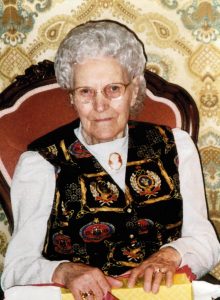Maria Tillmann-Geschwent Scholarship
 Maria Tillmann-Geschwent, née Kutkat, was born June 26, 1909 in Skrympen, Lithuania. Her life was marked by hard work and caring for her family, and even her early years reflected determination and diligence to assure the survival of her loved-ones in the face of the hardships of war.
Maria Tillmann-Geschwent, née Kutkat, was born June 26, 1909 in Skrympen, Lithuania. Her life was marked by hard work and caring for her family, and even her early years reflected determination and diligence to assure the survival of her loved-ones in the face of the hardships of war.
She was widowed in 1940 and left her homeland in 1941 because it had become part of the Soviet Union. Maria sought refuge for herself and her children with relatives in Pomerania, then a part of Germany. She returned in 1942 after the Germans had occupied Lithuania. In 1944, with the Russians approaching, she packed what belongings could be carried and headed west on foot accompanied by her two young boys and 60-year-old mother. After months of indescribable hardship and misery they finally reached the Baltic Coast where they boarded one of the last refugee ships leaving for Hamburg, Germany.
After their arrival, it was one Displaced Persons’ camp after another until the family finally settled in Phillipsthal, an east-west border town in Hesse. Even though she had lost all her possessions, she didn’t complain. She started working as a seamstress to support the family and made it a point, whenever she received anything, to reciprocate in one way or another. Right from the start she made an effort to become fluent in the German language.
With four people living in one small room in Phillipsthal, she knew that she had to find a better way to provide for her family. When the opportunity came to immigrate to America, she packed up again. Sponsored by a friend of a friend in the U.S. and with the help of the Lutheran Church, Maria and the boys arrived in Philadelphia in 1951. She found work immediately and started working, often ten hours a day, sometimes six days a week.
At home, she only spoke German, knowing that it was more advantageous for the children than Lithuanian. She also dedicated herself to assuring that her boys got an education, knowing that a good education would guarantee them a better life. She died at the age of 100 years and 8 months.
Maria had always taken an active interest in the lives of her grandchildren and great-grandchildren, always speaking German to them. She just pretended not to understand English, and it became so ingrained that to the day she died, her family always switched from English to German as soon as they addressed her.
In Maria’s memory her son, Ronald E. Tillmann, established the Maria Tillmann-Geschwent Trust and Student Fund which is used to provide awards, scholarships and incidentals, such as field trips, to students who demonstrate achievement in German history, culture and language.
The German-American Heritage Foundation is proud to honor the legacy of this unique woman with the Maria Tillmann-Geschwent Scholarship. We will award two $2,500 to qualified students each year.
Questions? Contact [email protected]